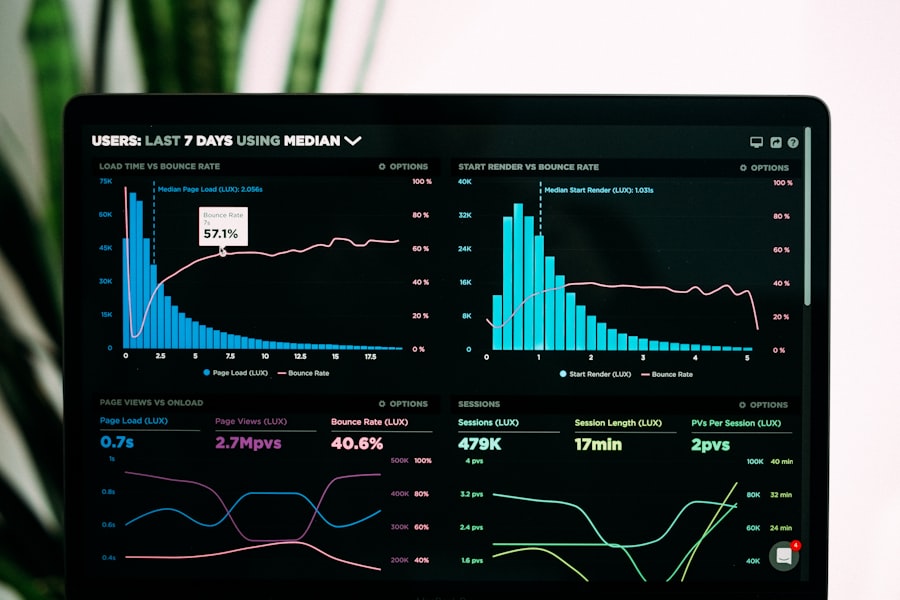In recent years, the integration of artificial intelligence (AI) into personal financial management apps has revolutionized the way individuals approach their finances. These applications, once limited to basic budgeting tools and expense trackers, have evolved into sophisticated platforms that leverage AI to provide users with tailored financial insights and recommendations. The rise of AI in this domain is not merely a trend; it represents a fundamental shift in how technology can enhance personal finance management.
By harnessing vast amounts of data and employing advanced algorithms, these apps can analyze spending habits, predict future financial trends, and offer personalized advice that empowers users to make informed decisions about their money. The significance of AI in personal finance cannot be overstated. As consumers face increasingly complex financial landscapes, the need for intuitive and intelligent tools has never been greater.
AI-driven financial management apps are designed to simplify the user experience while providing deeper insights into financial behavior. They can identify patterns in spending, suggest areas for savings, and even alert users to potential financial pitfalls. This level of engagement not only helps users stay on top of their finances but also fosters a sense of financial literacy that is crucial in today’s economy.
As we delve deeper into the various ways AI enhances personal financial management, it becomes clear that these technologies are not just tools; they are essential partners in achieving financial well-being.
Key Takeaways
- AI is revolutionizing personal financial management apps by providing advanced capabilities for budgeting, expense tracking, predictive analysis, investment management, fraud detection, personalized recommendations, and insights.
- AI improves budgeting and expense tracking by automating data entry, categorizing expenses, identifying spending patterns, and providing real-time insights to help users make informed financial decisions.
- AI plays a crucial role in predictive analysis for financial planning by analyzing historical data, identifying trends, and forecasting future financial scenarios to help users plan and prepare for their financial goals.
- AI has a significant impact on investment management and portfolio optimization by analyzing market trends, identifying investment opportunities, and optimizing portfolios to maximize returns and minimize risks.
- AI is used in fraud detection and security in financial apps by analyzing user behavior, detecting anomalies, and preventing unauthorized access and fraudulent activities to ensure the security of users’ financial information.
- AI provides personalized financial recommendations and insights by analyzing users’ financial data, understanding their financial goals, and providing tailored recommendations to help users achieve their financial objectives.
- The future of AI in personal financial management apps is promising, with advancements in machine learning, natural language processing, and predictive analytics, leading to more sophisticated and personalized financial solutions for users.
How AI Improves Budgeting and Expense Tracking
Revolutionizing Budgeting with AI
Artificial intelligence has made significant contributions to personal financial management, particularly in the realm of budgeting and expense tracking. Traditional methods often require manual input, which can be time-consuming and lead many individuals to abandon their budgeting efforts. However, AI-powered apps have streamlined this process by automatically categorizing transactions and providing real-time insights into spending habits.
Dynamic Budgeting and Real-Time Insights
By analyzing users’ transaction histories, AI-powered applications can create dynamic budgets that adapt to changing financial circumstances. This ensures that users remain aware of their spending patterns without the burden of constant manual updates. Moreover, AI can identify anomalies in spending behavior, alerting users to unusual transactions that may indicate overspending or potential fraud.
Personalized Feedback and Actionable Insights
AI-powered apps can also provide personalized feedback and actionable insights to help users develop healthier financial habits. For instance, if an app detects that a user consistently overspends in a particular category, it can suggest adjustments to their budget or offer tips on how to curb unnecessary expenses. By transforming budgeting from a tedious chore into an engaging and informative experience, AI ultimately leads to better financial outcomes for users.
The Role of AI in Predictive Analysis for Financial Planning

Predictive analysis is another area where AI shines in personal financial management. By utilizing historical data and advanced algorithms, AI can forecast future financial trends and outcomes with remarkable accuracy. This capability is particularly valuable for individuals looking to plan for significant life events such as buying a home, funding education, or preparing for retirement.
AI-driven financial planning tools can analyze a user’s income, expenses, savings rate, and investment performance to project future financial scenarios, allowing users to make informed decisions about their financial goals. Furthermore, predictive analysis can help users understand the potential impact of various financial choices on their long-term objectives. For example, an AI-powered app might simulate the effects of increasing monthly savings contributions or adjusting investment strategies on a user’s retirement fund.
By visualizing these scenarios, users can better grasp the importance of proactive financial planning and make adjustments as needed to stay on track toward their goals. This level of foresight not only enhances users’ confidence in their financial decisions but also encourages a more strategic approach to managing their finances over time.
AI’s Impact on Investment Management and Portfolio Optimization
The integration of AI into investment management has transformed how individuals approach portfolio optimization. Traditionally, investment strategies relied heavily on human intuition and market analysis; however, AI introduces a data-driven approach that enhances decision-making processes. By analyzing vast amounts of market data in real-time, AI algorithms can identify trends and patterns that may not be immediately apparent to human investors.
This capability allows for more informed investment choices and the potential for higher returns. Moreover, AI can assist in portfolio optimization by continuously monitoring asset performance and adjusting allocations based on market conditions and individual risk tolerance. For instance, an AI-driven investment app can automatically rebalance a user’s portfolio in response to market fluctuations or changes in personal circumstances, such as a shift in risk appetite or investment goals.
This level of automation not only saves time but also ensures that users’ portfolios remain aligned with their long-term objectives. As a result, individuals can invest with greater confidence, knowing that they have access to cutting-edge technology that enhances their investment strategies.
The Use of AI in Fraud Detection and Security in Financial Apps
As personal finance apps become increasingly popular, the importance of security cannot be overlooked. With sensitive financial information at stake, users must feel confident that their data is protected from fraud and cyber threats. AI plays a crucial role in enhancing security measures within these applications by employing advanced algorithms that detect suspicious activity in real-time.
By analyzing user behavior patterns and transaction histories, AI can identify anomalies that may indicate fraudulent activity, such as unauthorized transactions or unusual spending patterns. In addition to detecting fraud, AI can also bolster security through biometric authentication methods such as facial recognition or fingerprint scanning. These technologies provide an additional layer of protection that is difficult for malicious actors to bypass.
Furthermore, as cyber threats continue to evolve, AI systems can learn from new data and adapt their security protocols accordingly. This continuous improvement ensures that personal finance apps remain resilient against emerging threats, giving users peace of mind as they manage their finances digitally.
AI’s Role in Personalized Financial Recommendations and Insights

The Power of Personalization in Finance Management
Personalization is at the heart of many successful personal finance management apps, and AI is the driving force behind this tailored approach. By analyzing individual user data—such as spending habits, income levels, and financial goals—AI can generate personalized recommendations that resonate with each user’s unique circumstances. For example, an app might suggest specific savings strategies based on a user’s spending patterns or recommend investment opportunities aligned with their risk tolerance and financial objectives.
Deeper Understanding and Engagement
Moreover, these personalized insights extend beyond mere recommendations; they foster a deeper understanding of one’s financial situation. Users can receive alerts about upcoming bills or reminders about savings goals, ensuring they remain engaged with their finances on a daily basis. This level of interaction not only empowers users to take control of their financial lives but also cultivates a sense of accountability that is essential for achieving long-term success.
The Future of Personalization in Finance
As AI continues to evolve, the potential for even more sophisticated personalization will only enhance the user experience within personal finance management apps.
The Future of AI in Personal Financial Management Apps
Looking ahead, the future of AI in personal financial management apps appears promising and full of potential. As technology continues to advance at an unprecedented pace, we can expect even more innovative features that will further enhance user experience and engagement. For instance, the integration of machine learning algorithms could lead to even more accurate predictive analysis and personalized recommendations based on evolving user behavior and market conditions.
This adaptability will ensure that users receive timely insights that reflect their current financial landscape. Additionally, as consumers become more aware of the importance of financial literacy, there will likely be a growing demand for educational resources within these apps. Future iterations may incorporate interactive learning modules powered by AI that help users understand complex financial concepts while providing practical applications tailored to their unique situations.
Ultimately, the ongoing evolution of AI in personal finance management will not only empower individuals to take charge of their finances but also contribute to a more financially literate society as a whole. As we embrace this technological revolution, it is clear that AI will play an integral role in shaping the future of personal finance management for years to come.
If you’re interested in how AI can enhance your financial management through apps, you might also find value in exploring the latest technological gadgets that can support these applications. A relevant article to check out is a review of smartwatches by Xiaomi, which discusses how these devices integrate with personal finance apps to help manage your budget and expenses directly from your wrist. For more details, read the full review on Xiaomi Smartwatches. This could provide additional insights into how wearable technology and AI are merging to make personal finance management more accessible and efficient.
FAQs
What is AI?
AI, or artificial intelligence, refers to the simulation of human intelligence in machines that are programmed to think and learn like humans. This includes tasks such as problem solving, understanding language, and recognizing patterns.
What are personal financial management apps?
Personal financial management apps are software applications designed to help individuals manage their finances. These apps typically offer features such as budgeting, expense tracking, investment tracking, and bill payment reminders.
How does AI play a role in personal financial management apps?
AI plays a role in personal financial management apps by providing advanced capabilities such as predictive analytics, personalized recommendations, and automated financial decision-making. AI can analyze a user’s financial data to provide insights and suggestions for improving their financial health.
What are some examples of AI-powered features in personal financial management apps?
AI-powered features in personal financial management apps may include personalized budget recommendations based on spending patterns, automated categorization of expenses, intelligent alerts for potential fraudulent activity, and investment portfolio optimization based on market trends.
What are the benefits of AI in personal financial management apps?
The benefits of AI in personal financial management apps include improved accuracy in financial analysis, personalized recommendations for better financial decision-making, time-saving automation of routine tasks, and enhanced security measures for protecting sensitive financial information.
Are there any potential drawbacks or concerns related to AI in personal financial management apps?
Potential drawbacks or concerns related to AI in personal financial management apps may include privacy issues related to the collection and use of personal financial data, the potential for algorithmic biases in decision-making, and the need for users to understand and trust the AI-powered features.

